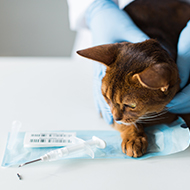
New measures to crack down on pet theft will be 'announced in due course'
Government ministers are considering plans to make cat microchipping compulsory under new measures to tackle the growing issue of pet theft.
According to The Telegraph, pet owners will be required to microchip their cats so they can be identified if stolen and resold, with fines of up to £500 for people who fail to do so.
It also reports that ministers are planning a ban on selling pets for cash to make it harder to sell them on the black market.
A DEFRA spokesperson told MRCVSOnline that it will announce the next steps 'in due course'.
“Last month, the Home Secretary, Lord Chancellor and Environment Secretary met to discuss a cross-government approach to combatting this issue and we will announce next steps in due course," they said. “This builds upon the huge amount of work already undertaken by junior ministers and official to address this cruel and criminal practice.”
The plans come amid a rising number of pet thefts in the UK. The charity DogsLost said that reports of pet theft have increased by 170 per cent in the last year, from 172 dogs in 2019 to 465 in 2020.
A report by Pet Theft Awareness also found that cat theft has risen by 12.3 per cent in the past year. The figures, obtained through a freedom of information request, show that desirable breeds such as the Bengal, Siamese and Persian, remain the most targeted by cat thieves.
Late last year, the government launched an eight-week consultation on plans to make it mandatory for pet owners to microchip their cats. It came in response to a previous call for evidence, which revealed that around 2.6 million cats in the UK do not have a microchip.



 The Veterinary Medicines Directorate (VMD) is inviting applications from veterinary students to attend a one-week extramural studies (EMS) placement in July 2026.
The Veterinary Medicines Directorate (VMD) is inviting applications from veterinary students to attend a one-week extramural studies (EMS) placement in July 2026.